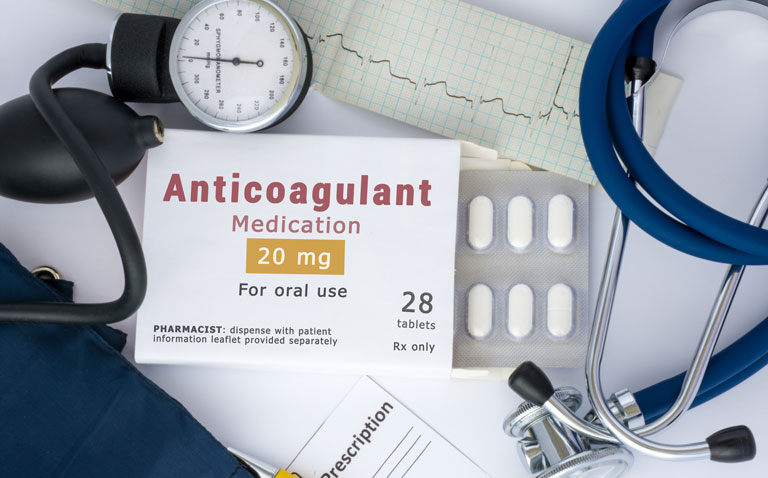A number of the early reports from China on the clinical characteristics of patients with pneumonia-associated COVID-19 indicated that a proportion suffered from coagulopathy (clotting disorder).
For example, in a cohort of 183 patients in Wuhan, non-survivors had significantly higher D-dimer, fibrin degradation products and longer prothrombin times.1 Furthermore, in that same study, 71% of the non-survivors met the diagnostic criteria for disseminated intravascular coagulation (DIC), a rare, but serious condition in which small blood clots develop throughout the bloodstream blocking vessels and in more serious cases precipitating multiple organ failure. Case reports have also identified clinically significant coagulopathy and antiphospholipid antibodies (which increases the risk of blood clots) in COVID-19 patients2 and in a further study of 94 patients with confirmed COVID-19 infection, those who tested positive had higher D-dimer, fibrin/fibrinogen degradation products and fibrinogen levels.3 Given that coagulopathy appears to be a complication of infection with COVID-19, is it possible that patients treated with systemic anticoagulants are less likely to experience more severe disease and have a greater chance of survival? Emerging data suggests that this might be the case although the evidence is far from clear-cut.
The link between the acute inflammation induced by a severe infection and activation of the coagulation system has been known for many years with damaged endothelial cells playing a key role in the orchestration of events. Several studies of viral infections such as influzena have revealed that dysfunctional coagulation is a common complication of severe influenza-induced pneumonia,4 indicating that the innate immune and haemostatic systems are intimately linked. This interrelationship was clearly illustrated in a study in which infection with streptococcus pyogenes led to a rapid entrapment and killing of the microorganism within a clot.5 In other words, recognition of an invading pathogen by the innate immune system was able to activate the coagulation system which then facilitated killing of the organism.
Viral infection of endothelial cells damages the cells and this leads to the production of pro-inflammatory cytokines which apart from having anti-viral properties, are also responsible for damage to the host. In fact studies of the H1N1 virus (‘swine flu”) demonstrated how it can lead to over-expression of pro-inflammatory cytokines producing what has become known as a “cytokine storm”.6 In addition, the damaged endothelial cells release the membrane-bound protein, tissue factor which subsequently activates the coagulation system.7 The clinical picture of virally-induced over-activity of the coagulation system presents with both haemorrhagic and thrombotic events and this has been observed in those with H1N1.8,9 Nevertheless, other pathogens, such as those responsible for urinary tract infections can also increase the risk of thrombotic events.10
Because a consequence of viral infections is activation of a hypercoagulatory state, it is theoretically possible that the use of anticoagulant therapy could attenuate this effect in patients with COVID-19 and some preliminary data offers support for this theory. In a study of 2,075 hospitalised Spanish patients who were positive for COVID-19, it was found that the use of heparin was associated with a significant reduction in mortality (adjusted hazard ratio, HR = 0.55).11 A further Chinese study of 449 patients found that the use of heparin for 7 or more days resulted in a lower 28-mortality in patients (40% vs 64.2%) among patients with sepsis-induced coagulopathy compared to those without the condition.12 However, the study did not find a difference in 28-day mortality between those with and without heparin, i.e., the reduced mortality was only apparent in the more severe cases and not necessarily directly related to heparin use. Finally, in a US study of 2,773 hospitalised COVID-19 patients, of those requiring mechanical ventilation (n = 395), mortality fell from 62.7% to 29.1% for those prescribed systemic anticoagulants.13
The problem in trying to establish a causal relationship between anticoagulant use and reduced mortality is confounded by the fact that unless contra-indicated, the majority of those hospitalised because of the virus, will receive low molecular weight heparins on admission for immobility. It therefore remains to be seen whether anticoagulant use offers any enhanced protection against the virus although such treatment will reduce chance of thromboembolic events which might also prove to be fatal.
References
- Tang N et al. Abnormal coagulation parameters are associated with poor prognosis in patients with novel coronavirus pneumonia. J Thromb Haemost 2020;18(4):844–7.
- Zhang Y et al. Coagulopathy and antiphospholipid antibodies in patients with COVID-19. N Eng J Med 2020;382:e38.
- Han H et al. Prominent changes in blood coagulation of patients with SARS-CoV-2 infection. Clin Chem Lab Med 2020 Mar 16; doi: 10.1515/cclm-2020-0188
- Yang Y, Tang H. Aberrant coagulation causes a hyper-inflammatory response in severe influenza pneumonia. Cell Mol Immunol 2016;13(4):432–42.
- Loof TG et al. Coagulation, an ancestral serine protease cascade, exerts a novel function in early immune defence. Blood 2011; 118(9):2589–98.
- D’Elia RV et al. Targeting the “cytokine storm” for therapeutic benefit. Clin Vaccine Immunol 2013;20(3):319–27.
- Butenas S, Orfeo T, Mann KG. Tissue factor in coagulation: which? Where? When? Arterioscler Thromb Vasc Biol 2009;29(12):1989–96.
- Bunce PE et al. Pandemic H1N1 influenza infection and vascular thrombosis. Clin Infect Dis 2011;52(2):e14-7.
- Jeganathan N et al. Acute haemorrhagic leukoencephalopathy associated with influenza A (H1N1) Virus. Neurocrit Care 2013;2:218–21.
- Smeeth L et al. Risk of deep vein thrombosis and pulmonary embolism after acute infections in a community setting. Lancet 2006;367:1075–9.
- Ayerbe L, Risco C, Ayis S. The association between treatment with heparin and survival in patients with Covid-19. J Thromb Thrombolysis 2020; May 31. doi: 10.1007/s11239-020-02162-z
- Tang N et al. Anticoagulant treatment is associated with a decreased mortality in severe coronavirus disease 2019 patients with coagulopathy. J Throm Haemost 2020;18(5):1094–9.
- Paranjpe I et al. Association of treatment dose of anticoagulation with in-hospital survival among hospitalised patients with COVID-19. J Am Coll Cardiol 2020;May 5: S0735-1097.










